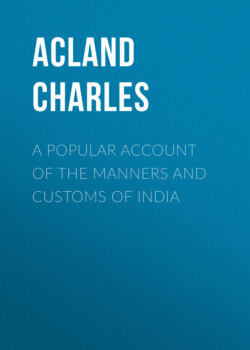Читать книгу A Popular Account of the Manners and Customs of India - Acland Charles - Страница 6
На сайте Литреса книга снята с продажи.
ОглавлениеNATIVE SERVANTS.
We have no bells by which to summon the servants, who lie on the mat outside the room door; when we require them we call out, without rising from the sofa, "Qui hi?" (who is there?) then the sirdar, or valet, runs in. We give him our orders, which he reports to the others. Although I am staying at the bishop's, and dine at his table, and use his carriage, I am obliged to have five servants. I have one kitmajar, or waiter, who does nothing but attend at table. The bishop's kitmajars will wait only upon their own master. Then I have one ayah, or lady's-maid, for my wife; a sirdar, or bearer; and a matee-sirdar, or assistant-bearer. These men make the beds and assist me to dress. I have also a punkah-bearer—that is, a man who sits outside the room, and is constantly employed in pulling a string fastened to a punkah, or enormous fan, without which no Englishman could live in India. Besides these I pay a pooney-bearer, or water-carrier, and a matranes. When I go up the country I shall be obliged to have a consummar, or head servant; a dobee, or washerwoman; a dugay, or tailor; a syce, or grass-cutter; and one or two others. We cannot do with less, because, if I were to ask the kitmajar to fetch my coat, he would twist his mustachios, and say, "Me no sirdar;" or if I were to ask my sirdar to wait at table, he would say, "Kitmajar no do dat."
